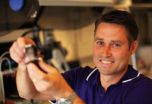(Press-News.org) Australian astronomers have shown galaxies in the vast empty regions of the Universe are actually aligned into delicate strings in research published today in the Monthly Notices of the Royal Astronomical Society.
A team of astronomers based at The University of Western Australia node of the International Centre for Radio Astronomy Research (ICRAR) has found short strings of faint galaxies in what were previously thought to be extremely empty parts of space.
The Universe is full of vast collections of galaxies that are arranged into an intricate web of clusters and nodes connected by long strings. This remarkably organized structure is often called the 'cosmic web', with busy intersections of galaxies surrounding vast spaces, empty of anything visible to us on Earth.
"The spaces in the cosmic web are thought to be staggeringly empty," said Dr Mehmet Alpaslan, who led the research. "They might contain just one or two galaxies, as opposed to the hundreds that are found in big clusters."
These huge, empty regions are called voids, and for years, astronomers have been trying to understand the small population of galaxies that inhabit them.
Using data from the Galaxy and Mass Assembly (GAMA) survey, Alpaslan and his colleagues found that the small number of galaxies inside these voids are arranged in a new way never seen before.
"We found small strings composed of just a few galaxies penetrating into the voids, a completely new type of structure that we've called 'tendrils'," said Alpaslan.
To discover tendrils, the GAMA team created the largest ever galaxy census of the southern skies using observations from the Anglo-Australian Telescope in NSW, Australia.
"Our new catalogue has looked deeper into space and mapped each patch of sky up to ten times to make sure it's as thorough as possible," said Dr Aaron Robotham from The University of Western Australia node of ICRAR.
"We weren't sure what we'd find when we looked at voids in detail, but it was amazing to find so many of these tendrils lurking in regions that have previously been classified as empty," said Robotham.
"This means that voids might be much smaller than we previously thought, and that galaxies that were previously thought to be in a void might just be part of a tendril," said Alpaslan.
The GAMA team plan to catalogue more tendrils for further study as their detailed map of the Universe expands.
INFORMATION:
Further Information
ICRAR is a joint venture between Curtin University and The University of Western Australia that receives funding from the State Government of Western Australia. Mehmet Alpaslan is a PhD candidate at St Andrews University, Scotland and is supervised by Professor Simon Driver and Dr Aaron Robotham at The University of Western Australia node of ICRAR.
The Galaxy and Mass Assembly (GAMA) survey is an international collaboration to map the Universe led by Professor Simon Driver at ICRAR.
GAMA website: http://www.gama-survey.org/
Contacts
Dr Mehmet Alpaslan (Timezone: US Pacific Standard Time, GMT-8)
PhD Graduate – St Andrews University
M: +1 702 848 97 28
E: mehmet.alpaslan@icrar.org
Dr Aaron Robotham (Timezone: Australian Western Standard Time, GMT+8)
ICRAR – UWA
Ph: +61 8 6488 5564
E: aaron.robotham@icrar.org
Kirsten Gottschalk (Timezone: Australian Western Standard Time, GMT+8)
Media Contact, ICRAR
Ph: +61 8 6488 7771
M: +61 438 361 876
E: kirsten.gottschalk@icrar.org
These aren't the voids you're looking for
Astronomers find faint strings of galaxies inside empty space
2014-03-10
ELSE PRESS RELEASES FROM THIS DATE:
A tricky balancing act: Antibiotics versus the gut microbiota
2014-03-10
(March 10, 2014) Antibiotics are valuable, potentially life-saving tools that have significantly reduced human morbidity and mortality. Unfortunately, antibiotics may also have unintended consequences from their off-target effects that may increase the risk of many long-term conditions. Recent epidemiologic studies have detected a possible link between antibiotic use in childhood and weight gain1 — with disruption to the normal gut microbiota considered the most likely cause.
"Infancy is an important time in the development of the human microbiota and these studies provide ...
Feeding gut microbiota: Nutrition & probiotics are key factors for digestive health
2014-03-10
(March 10, 2014) A healthy and balanced diet, as well as probiotics, have been known to be helpful in preserving gastrointestinal health for quite a long time. But it is only recently that the underlying mechanisms have become somewhat clearer. A rapidly increasing body of knowledge promises to further clarify the effects of our daily food on the gut microbiota and to indicate more targeted applications of probiotics in the near future. This was one of the topics presented at the Gut Microbiota for Health World Summit in Miami, FL, USA. On March 8-9, 2014, internationally ...
Lower IQ in teen years increase risk of early-onset dementia
2014-03-10
Men who at the age of 18 years have poorer cardiovascular fitness and/or a lower IQ more often suffer from dementia before the age of 60. This is shown in a recent study encompassing more than one million Swedish men.
In several extensive studies, researchers at the Sahlgrenska Academy of Gothenburg University have previously analyzed Swedish men's conscription results and were able to show a correlation between cardiovascular fitness as a teenager and health problems in later life.
Increased risk for early-onset dementia
In their latest study, based on data from 1.1 ...
Healthy eating may reduce the risk of preterm delivery
2014-03-10
In the study, which was conducted by researchers from the University of Gothenburg, Sahlgrenska University Hospital and the Norwegian Institute of Public Health, the participants completed a scientifically evaluated questionnaire about what they had been eating and drinking since becoming pregnant.
The researchers also had access to information about the women's general lifestyle e.g. level of education, living conditions, income, weight, physical activity, smoking habits, alcohol consumption, number of children and medical factors such as history of preterm delivery.
15 ...
Computer system simulates the behavior of tax evaders
2014-03-10
Tax fraud is a very serious problem for society, especially in Spain, where tax evasion represents almost one-fourth of its Gross Domestic Product. On the one hand, evasion is a problem because it produces a loss in public resources, something which is especially difficult in a time of economic crisis with cutbacks in public funding; on the other hand, tax fraud damages the effectiveness of justice within the tax system, since not everyone is able to evade taxes equally, thus leading to injustices between small and large companies and between the self-employed and employees. ...
New sugar-test to reduce false-positive cancer diagnoses
2014-03-10
The world's most widespread test for ovarian cancer reports false-positives in 94 of 100 diagnosed cases. Now, chemists at the University of Copenhagen working with clinical researchers at University College London have developed a method able to halve the number of false-positives. When fully developed, the new test will spare a significant number of women from unnecessary worry and further testing. Furthermore, global health care providers stand to save substantial sums – just by including a test on a certain sugar molecule in tandem with the currently prevailing diagnostic ...
There is no beating the breathalyzer this St. Patrick's Day (video)
2014-03-10
WASHINGTON, March 10, 2014 — If you're having some drinks this St. Patrick's Day weekend, remember to have a designated driver, otherwise you may end up on the business end of a breathalyzer on the side of the road. If you think you can beat it, think again; chemistry will land you in cuffs. In the American Chemical Society's (ACS') latest Reactions video, we examine how your breath can get you busted when you've had too much to drink. The video is available here: http://youtu.be/rvVzlg26bCM
Subscribe to the series at Reactions YouTube, and follow us on Twitter @ACSreactions ...
Europe must improve its response to the threat of plant pests and diseases
2014-03-10
Potentially devastating plant pests and diseases are highlighted in a new report from EASAC, the European Academies' Science Advisory Council, the leading provider of independent scientific advice to Europe's policy-makers. In the detailed EU-wide study of emerging plant pests and diseases, EASAC describes their combined threat to crops and forests and wider ecosystems, with implications for human health. In economic terms, as admitted by the EU Commission, billions of euros could be at stake and the environmental impact may be irreversible. Prof. Anne Glover, Chief Scientific ...
Young skin cancer survivors at risk of other cancers later
2014-03-10
Australian author on the paper, Professor Rodney Sinclair, Professor of Medicine at the University of Melbourne and Director of Dermatology at Epworth HealthCare said that the risk decreased significantly with increasing age, but it remains higher compared with individuals who have never had NMSC.
"The risk for developing any cancer subsequent to NMSC decreases significantly with increasing age: 23 times higher risk for those under 25 years of age; 3.52 for those 25-44 years of age; 1.74 for those 45- 59 years of age; and 1.32 for those older than 60 years.
Published ...
Rice synthetic biologists shine light on genetic circuit analysis
2014-03-10
In a significant advance for the growing field of synthetic biology, Rice University bioengineers have created a toolkit of genes and hardware that uses colored lights and engineered bacteria to bring both mathematical predictability and cut-and-paste simplicity to the world of genetic circuit design.
"Life is controlled by DNA-based circuits, and these are similar to the circuits found in electronic devices like smartphones and computers," said Rice bioengineer Jeffrey Tabor, the lead researcher on the project. "A major difference is that electrical engineers measure ...
LAST 30 PRESS RELEASES:
Study: Reported crop yield gains from breeding may be overstated
Stem cells from human baby teeth show promise for treating cerebral palsy
Chimps’ love for crystals could help us understand our own ancestors’ fascination with these stones
Vaginal estrogen therapy not linked to cancer recurrence in survivors of endometrial cancer
How estrogen helps protect women from high blood pressure
Breaking the efficiency barrier: Researchers propose multi-stage solar system to harness the full spectrum
A new name, a new beginning: Building a green energy future together
From algorithms to atoms: How artificial intelligence is accelerating the discovery of next-generation energy materials
Loneliness linked to fear of embarrassment: teen research
New MOH–NUS Fellowship launched to strengthen everyday ethics in Singapore’s healthcare sector
Sungkyunkwan University researchers develop next-generation transparent electrode without rare metal indium
What's going on inside quantum computers?: New method simplifies process tomography
This ancient plant-eater had a twisted jaw and sideways-facing teeth
Jackdaw chicks listen to adults to learn about predators
Toxic algal bloom has taken a heavy toll on mental health
Beyond silicon: SKKU team presents Indium Selenide roadmap for ultra-low-power AI and quantum computing
Sugar comforts newborn babies during painful procedures
Pollen exposure linked to poorer exam results taken at the end of secondary school
7 hours 18 mins may be optimal sleep length for avoiding type 2 diabetes precursor
Around 6 deaths a year linked to clubbing in the UK
Children’s development set back years by Covid lockdowns, study reveals
Four decades of data give unique insight into the Sun’s inner life
Urban trees can absorb more CO₂ than cars emit during summer
Fund for Science and Technology awards $15 million to Scripps Oceanography
New NIH grant advances Lupus protein research
New farm-scale biochar system could cut agricultural emissions by 75 percent while removing carbon from the atmosphere
From herbal waste to high performance clean water material: Turning traditional medicine residues into powerful biochar
New sulfur-iron biochar shows powerful ability to lock up arsenic and cadmium in contaminated soils
AI-driven chart review accurately identifies potential rare disease trial participants in new study
Paleontologist Stephen Chester and colleagues reveal new clues about early primate evolution
[Press-News.org] These aren't the voids you're looking forAstronomers find faint strings of galaxies inside empty space





